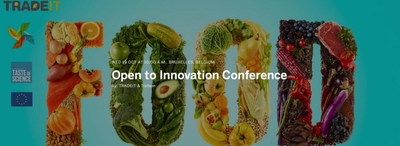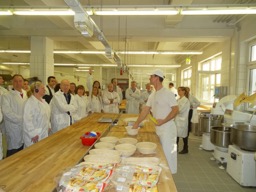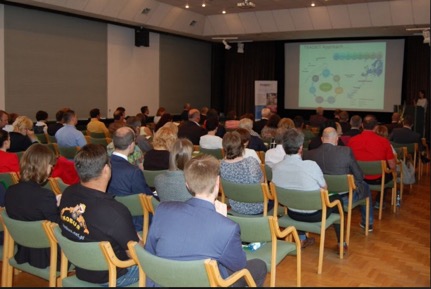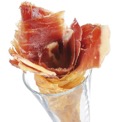Brokerage Events Review: Lessons from TRADEIT – Part I
Editor’s by-line
by Joan Lockyer
The completion of the Brokerage Events is an important TRADEIT milestone, so two newsletters will focus on the contribution to the project that these events have made so far. This newsletter is part I focussing on the TRADEIT Brokerage Events and the first five lessons learned.
The act of brokerage is bringing together individuals with a common interest. This may be a problem to solve, a solution to offer or a different approach that needs to be tested or explored. The common threads have been technology and innovation.
|
 |  |
Open to Innovation Conference
Networks for the sustainability of Traditional Food Sector in Europe
 |

The TRADEIT and Trafoon Networks invite you to a joint closing conference titled - Open to Innovation: Networks for the sustainability of Traditional Food Sector in Europe. This event will share a vision for the future development of the SME food sector in Europe.
This vision has emerged from 3 years of regional engagement with SMEs, SME associations and researchers across Europe. The conference will present outcomes, best practices and recommendations from the TRADEIT and Trafoon projects with a special focus on:
- Vision for the Development of SME Food Sector in Europe
- SME Case Studies: Successes and Impacts of the TRADEIT & Trafoon Projects
- Best Practice Developed on Knowledge Exchange to SMEs
- Integrating Entreprenneurial Thinking into Food Research Centres
- Role of Networks and Intermediaries for the Support of SMEs
The TRADEIT and Trafoon Networks are composed of key actors in the food sector, including food producers, regional SME networks, food industry associations, enterprise development experts and leading research and innovation centres from across Europe.
It would be our great pleasure if you could attend and participate in this event. Participants will have the opportunity to network, share ideas and explore future collaborations with the members of the Networks. The event will close with an extended networking session to allow participants time to formalise connections and next steps. Click here to register now.
TRADEIT Coordinator Helena McMahon,
Trafoon Coordinator Susanne Braun,
We hope you can make it!
Kindest regards,
TRADEIT & Trafoon
When
Wednesday, 19 October 2016 at 10:00 - Thursday, 20 October 2016 at 17:00 (CEST)
Where
Thon Hotel Brussels City Centre - 17 Avenue du Boulevard, 1210 Bruxelles, Belgium - View Map
 |
|
 |  |
Lesson 1: Learning from each other as well as from the experts
Bakery: Brokerage with a practical twist
The Bakery Brokerage event was the first of the thematic brokerage events and it was held in Potsdam, Germany on the 6th and 7th November 2014. The event brought together some of the leading minds in Bakery with a focus on the Artisan and Traditional Baker.
The Bakery Brokerage event was the first of the thematic brokerage events and it was held in Potsdam, Germany on the 6th and 7th November 2014. The event brought together some of the leading minds in Bakery with a focus on the Artisan and Traditional Baker. The event comprised of keynote speakers; exhibition space; workshops and networking opportunities. This event aimed to build upon the Needs and Barriers Analysis undertaken at the start of the TRADEIT project and aimed to focus on the issues specifically identified for the bakery sector.
Themes and Key Issues
TRADEIT is designed to respond to the needs of food producers, food associations and food networks at a regional level via the provision of knowledge and technology solutions to address the particular challenges identified at a sectoral level. ILU is TRADEIT’s lead partner in the bakery sector. Utilizing their extensive understanding of this sector and in consultation with TRADEIT partners and the bakery SMEs within the project, the following thematic areas emerged: - The changing Image of the baker
- Product development
- Healthy bread opportunities
- Protein fortification
- Allergen management
- Gluten free
- Food safety
- Slow milling
The event programme that resulted was designed to enable participants to: - Be informed on and discuss the latest thinking on the future of craft baking.
- Take part in short, focused 20 minutes meetings designed to foster effective networking.
- Meet key R&D players offering technologies and services to TFP SMEs.
- Find solutions and make offers - identify and meet organizations offering or seeking solutions to business and technology issues.
- Learn from case studies and examples of best practice in innovation partnership development.
- Meet with potential partners and/or technology providers through preplanned brokerage meetings.
- Participate in a practical bakery session with craft bakers from across Europe.
Main Lesson Learned
The brokerage event was successful in a wide range of ways, the takeaway lesson from this event was the benefits gained from engaging participants practically in activities where possible.
The practical bakery session was intended to build stronger links between the bakers by allowing them to share their approach and expertise. This session brought together craft bakers from across Europe who came together to bake collaboratively (craft bakers from Poland, Spain, Portugal, Finland, Ireland, Great Britain and Italy).

The workshop was successful not only for the bakery SMEs, but also for the research institutes and technology providers who were very interested in the baking show. After the workshop, some participants contacted the organizers to request the recipes for the baked products demonstrated in the sessions.
In addition, participants were given a tour of the IGV-site and facilities. The aim of the site visit was to showcase some the technology and innovation being undertaken at IGV and to give participants the opportunity to discuss any questions or queries they might have with IGV experts.
 |  |
Lesson 2: Consider the benefits of linking to a major International event
TRADEIT @ ANUGA FOODTEC, Cologne
Consumers invest deeply in brands and products which capture and reflect their own personal values. Traditional, craft and artisan food products typically have a brand built around regional sourcing and production with an implicit focus on sustainability.
Consumers invest deeply in brands and products which capture and reflect their own personal values. Traditional, craft and artisan food products typically have a brand built around regional sourcing and production with an implicit focus on sustainability. The reality is that in many cases small businesses face significant challenges in achieving the desired environmental performances.
This event aimed to provide participants with the access to the latest thinking on creating sustainable food businesses and access to important innovative technologies. In addition to presentation and case studies, participants were also able to participate in bespoke technology demonstrations arranged as part of the brokerage event.
As the leading global trade fair, Anuga FoodTec is one of the most important driving force of the international food and beverage industry. The organisers claim that,
“It is the only trade fair in the world that covers all aspects of food production. Whether machines or systems, packaging material and analytics, ingredients or services - the industry present their innovations and technological visions at Anuga FoodTec. It offers all solutions for all food industries - in a concentrated and targeted manner!”
It was for this reason that TRADEIT located one of its brokerage events at this important exhibition and conference. The exhibitors presented a vast range of solutions to energy, water and food resources issues; these had emerged as important inhibitors to growth when we surveyed SME at the beginning of the TRADEIT project.
In addition to a range of highly focused presentations from experts in the field, SMEs has free access to the exhibition and conference. ILU, as event organisers, arranged a series of exhibitions and meets with exhibitors for the brokerage event participants. Some demonstrations were sector specific; others were cross-sectoral, for example:
Exhibitor | Bakery | Meat | Dairy | TNO, Netherlands: Product development; sustainable food supply chain management | | | | VTT, Finland: Technology for upgrading raw-materials from side-streams | | | | Novarum, Ireland: Food safety, tracing and packaging | | | | GLATT GmbH: Sustainable whole process chain and agglomeration techniques. | | | | GLASS GmbH: Cost and energy efficient mixing, emulsifying and flattening systems | | | | Zeppelin Systems GmbH: Kneading systems | | | |
By aligning and locating the brokerage event at a major exhibition, we were able to secure not just an impressive range of speakers, but also able to expose SMEs to a very extensive range of technologies that had something to offer businesses of all sizes and interests.
 |  |
Lesson 3: Keep it real and keep it relevant to the audience
Innovation and Packaging Solutions for Small Food Producers
ITENE’s mission is to generate scientific and technological knowledge by adding value to companies through the implementation of packaging, transportation and logistic innovation solutions.
ITENE’s mission is to generate scientific and technological knowledge by adding value to companies through the implementation of packaging, transportation and logistic innovation solutions. In this respect their contribution to the TRADEIT project is unique and impacts upon all sectors equally. The Needs and Barriers Analysis, undertaken at the commencement of the project, identified packaging and logistics as two of the main areas impacting upon small businesses and limiting their ability to grow. These challenges are often related as packing solutions extend shelf life and therefore supports a wide range of logistical solutions open to small businesses looking to sell their products across a broader geographical base.
With the above in mind, this brokerage event was design to provide the Traditional Food Producer (TFP) SMEs with as many options as possible to their packing needs. By locating the event at HISPACK, it meant that they could explore a wide range of options and also access a substantial body of expertise.
The brokerage event formula used at the Sustainability Brokerage Event (discussed in Lesson 2), which took place at ANUGA FOODTEC, provided a template for this event, but the ambition was to build upon that and to add even more value for the SME participants.
The event aimed to provide the TFPs with the opportunity to explore new packaging solutions and technologies. The focus was on cutting edge technologies such as active and intelligent packaging, machinery, packaging optimization and new labelling, which would enable the food producers to extend the shelf life of their products, save costs and be aware of the ultimate trends in packaging innovation.
A number of large, high profile packaging technology companies represented on the rostrum, presenting some very advanced technologies. But keeping in mind the scale of the companies in the TRADEIT network and in attendance, there was a focus on ensuring that the solutions offered were relevant to the small food producers in the room. Below is an overview of the main subject areas covered by the speakers:
 | Active & Intelligent Packaging has a role to play in reduction of waste, in extending shelf-life, decimating costs and giving a more reliable indication of goods condition. | 
| 
| 
| 
| A novel commercial colour-code label indicator method to monitor and show the freshness and deterioration of packed chicken breasts. | | 
| |  | Active packaging describes mainly food packaging that interacts chemically or biologically with its contents or head space to extend shelf-life or enhance food safety. | 
| 
| 
|  | Bosch explored the next generation of packaging machines which they believe must be cabinet-free, adaptive, simple, efficient, and ready for connected industry as end users wish to optimize use of their production space. | 
| 
| 
| 
| FIAB brought users up-to-date with Regulation (EU) No 1169/2011 on the provision of food information to consumers which entered into application on 13th December 2014. | 
| 
| 
| 
| Unilever Sustainable Living Plan sets out how they plan to decouple their growth from environmental impact while increasing positive social impact. | 
| 
| 
|  | Research and Development projects are business projects of an applied nature for the creation and significant improvement of a production process, product or service submitted by one single company or by a group of businesses. | 
| 
| 
|
In addition to the expert’s contribution, two interactive workshops were held which allowed demonstrations and interactive discussions to take place. From ITENE, Mercedes Hortal demonstrated the benefits of active and intelligent packaging. Elena Cortes from the Enterprise Europe Network (EEN) moderated a discussion on how technology can meet the needs of small scale food producers in the field of packaging. These workshops followed a guided tour of the exhibition halls where specific technology solutions were identified that might meet the needs of the dairy, bakery and meat sectors.
To really consolidate the learning from this event, parallel workshops were held for each of the sectors in which experts from TRADEIT, packaging, FIAB and a sector expert (bakery, dairy or meat) held small very specific discussion with the SMEs to try to identify solutions to specific problems. This resulted in some very lively discussions as the SMEs challenged the experts to find solutions to their problems that were cost effective, added value and were technically feasible for a small producer.
The key learning outcome from this event, is that technology is moving fast and its very impressive. While the SMEs really valued the information and knowledge gained, they may not be in a position to invest in cutting edge systems and approaches. Currently technology, which is still new to the SMEs, may be innovative enough for their needs.
 |  |
Lesson 4: Use your networks
Craft Dairy Brokerage in Poznan
Organising a successful brokerage event requires real focus and detailed knowledge of the topic. Whilst the subject specialists are key to the process of developing a successful event, at TRADEIT our approach has been to assemble a group of partners, with wide ranging contacts in their marketplace in addition to their specialist knowledge of one particular sector.
Organising a successful brokerage event requires real focus and detailed knowledge of the topic. Whilst the subject specialists are key to the process of developing a successful event, at TRADEIT our approach has been to assemble a group of partners, with wide ranging contacts in their marketplace in addition to their specialist knowledge of one particular sector.
Accordingly, the Polish Dairy Hub Manager, in designing the programme for the Dairy event used the knowledge and contacts of TRADEIT colleagues to bring in a European wide dimension. However his own extensive professional and academic network underpinned the development of a program that reflected the needs of the producers and the latest thinking in academia.
TRADEIT is a project that is all about international co-operation, so the proposed schedule was shared with colleagues in other states and with the dairy producer SMEs who were already part of the project to ensure that the topics were relevant across the whole of the project area. The result was a program of speakers and researchers who offered new opportunities to the whole group of attendees.

Participants at the Poznan Dairy Brokerage Event
This focus is very important: it is essential to attract a good mix of researchers, technology providers and SME attendees. The topics to be discussed therefore have to be attractive to all. This requires a careful balancing act and still the agenda needed to be finalised in enough time to advertise it to the small businesses we need to attend. Small business needs are generally for technologies that can be adopted rapidly. In general the time people have for development work is short and investment in the business needs to be for relatively quick returns. This means that the technologies showcased need to be ready, or close to being ready, for the market.
The event in Poznan focussed on the needs of the Dairy Industry. As the organisers of the event, Food Concept is very well connected in this industry. Because of this, they were able to draw together speakers to cover four broad topics: - Trends in Dairy Markets
- New technologies in Traditional Dairy Production
- Sustainable Dairy Processing
- Food Safety and Authenticity
This programme attracted ninety-three attendees from Poland, Ireland, Belgium, the UK, Italy, Portugal and Spain. Most of them took part in the one to one meetings, (152 meetings took place), that were organised with other participants to discuss their needs and create new opportunities to innovate. It’s still early days but some very exciting projects have been started.
To maintain the theme, producers of local cheeses were present at the conference, sparking interest in their products from a number of European producers and a trip was organised to visit a Polish Dairy plant. All in all it was a fascinating event from which anticipate some exciting collaborations.
 |  |
Lesson 5: Use Tours and Practical Demonstrations
Innovation and Technology Transfer for Craft Meat SMEs
Cluster Food +I is a non-profit association comprising companies, research centres and regional government institutions that aims to promote the competitiveness and the development of the Ebro Valley region (Spain) food industry through collaboration and innovation.
Cluster Food +I is a non-profit association comprising companies, research centres and regional government institutions that aims to promote the competitiveness and the development of the Ebro Valley region (Spain) food industry through collaboration and innovation. Any company, body or entity wishing to innovate and get involved can become a member and be a part of the initiative. The number of associated SMEs is around 300 and their aim is to link together individuals and companies to contribute effectively to the transfer of technology, the creation of networks and the dissemination of information, achieving a level that ensures competitiveness. Arranging the Meat Brokerage event as part of the TRADEIT network therefore provided an ideal opportunity to do what they do best.
The Meat Brokerage Event (MBE) was the 4th in the programme of 6 events to be run by the TRADEIT project. Cluster Food + I was able therefore to capitalise on all the learning that had gone before and create an event that was right for our product and which showcased the region.
Two of the previous three events had been aligned to large international conferences and these had worked really well (as discussed in Lessons 2 and 3). For this event, they opted for a more local approach and decided to utilise their TRADEIT SME partner Martinez Somalo. The TRADEIT project is really fortunate to have this company as part of the network and were even more fortunate that we could build a tour of their premises into the programme.
Like the previous brokerage events, they had built a detailed programme of expert speakers and bi-lateral meetings into a compact one-day programme. Food demonstrations were added as feedback suggested that producers wanted more practical activities in the programmes. Four main themes formed the structure of the sessions delivered by the expert speakers: - Preservation and shelf-life
- Traceability and prevention of fraud
- Healthy meat products
- The consumer: in product design and in food trends.
Day 2 of the programme was the visit to Martinez Somalo.
  
The business has been operating now for four generations, since around 1900, in La Rioja. While still producing traditional products, the methods of production have been progressively upgraded and now include an impressive state of the art production facility.
Martinez Somalo produces a range of products, traditional and new, which includes: - Chorizo
- Loncheados
- Lomo
- Sarrano Ham: Bodega; Reserve; Gran Reserve and Gran Reserve “Family”
- Plus a who range of speciality products
The visit provided insights on the whole business process and created an opportunity to see how a family business, from very humble beginnings, can grow into a multi-million Euro operation. While staying close to its traditional product range, the business has embraced technology to increase output, but also to ensure that quality and the traditional ethos of the business are maintained.
 |
|
|
|